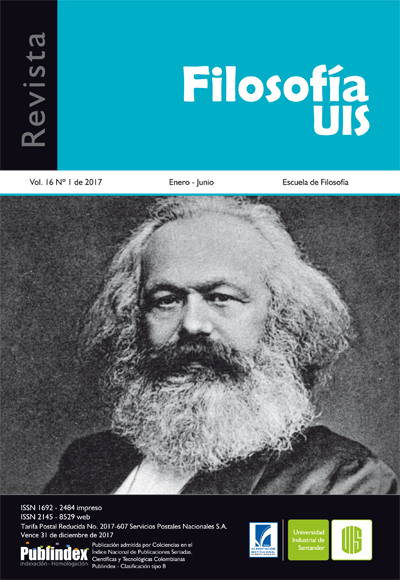1999: The slaughter of El placer or the political problem of the memory and the forgiveness
Published 2017-09-11
Keywords
- memory,
- politics,
- forgiveness,
- transitional justice,
- differend
How to Cite
Copyright (c) 2017 Revista Filosofía UIS

This work is licensed under a Creative Commons Attribution 4.0 International License.
Abstract
This paper attempts to analyze the case of the regime paramilitary which was victim the community of El Placer between 1999 and 2006. This essay has two main objectives. The first is to use some testimonies of the survivors to provide an overview of the hostile environment in which the population lived. Here, I pretend to emphasize, especially, the harm and the perpetration on the women. The second objective is to analyze the Colombian problem of the memory, the politics and the forgiveness through the notion of the differend (différend), concept proposed and developed by the philosopher Jean F. Lyotard. My impression is that, from this point of view, we can criticize (i) the lack of participation of the Colombian State in the armed conflict places, and (ii) the solutions that, through of the law and the model of transitional justice of this period, were propose to solve the harm of the victims. More than venture a thesis, this text is an attempt to approach a rather recurring problem in the current academics discussions in Colombia: How to deal with the problem of the reconciliation between the victims and the victimizers where what prevails is the recognition of a harm that, in principle, is unforgivable?
Downloads
References
Butler, J. (2009). Dar cuenta de sí mismo. Buenos Aires: Amorrortu Editores.
Chaparro, A. (2009). “El discurso sobre el conflicto armado” y “Estado y justicia transicional. El caso de las AUC”. En Chaparro, A. & Galindo, C. Génesis y Transformaciones del Estado Nación en Colombia. Bogotá: Editorial Universidad del Rosario.
De Gamboa, C. (Ed) (2010). El tránsito hacia la paz: de las herramientas nacionales a las locales. Bogotá: Editorial Universidad del Rosario.
Derrida, J. (2007). “Política y Perdón”. En Chaparro, A. (Ed.). Cultura Política y Perdón. Bogotá: Editorial Universidad del Rosario.
Galindo, H., Restrepo, A. Aponte, D. y Sánchez, F. (2009). “Conflicto y pobreza en Colombia”. En Restrepo A. y Aponte, D. (Eds). Guerra y violencias en Colombia. Herramientas e interpretaciones. Bogotá: Editorial Pontificia Universidad Javeriana
Informe del Centro Nacional de Memoria Histórica (2012). El Placer. Mujeres, coca y guerra en el Bajo Putumayo. Bogotá: Publicaciones Semana.
Lara, M. P. (2012). “Reconsiderando la perspectiva sobre el mal en el paradigma de la atrocidad”. En De Gamboa, C. & Uribe, Á. (Ed.). Fuentes del mal. Bogotá: Universidad Nacional de Colombia y Universidad del Rosario.
Levi, P. (2005). Trilogía de Auschwitz. Barcelona: Ediciones Océano.
Levinas, E. (2001). Entre nosotros. Ensayos para pensar en otro. Valencia: Edición Pre-Textos.
Lyotard, J. F. (1999). La diferencia. Barcelona: Ediciones Gedisa.
Palacios, M. (1995). Entre legitimidad y violencia (1875-1994). Bogotá: Editorial Norma.
Restrepo, A. J. (2009). “Análisis económicos de conflictos internos”. En Restrepo A. y Aponte, D. (Ed.). Guerra y violencias en Colombia. Herramientas e interpretaciones. Bogotá: Editorial Pontificia Universidad Javeriana.
